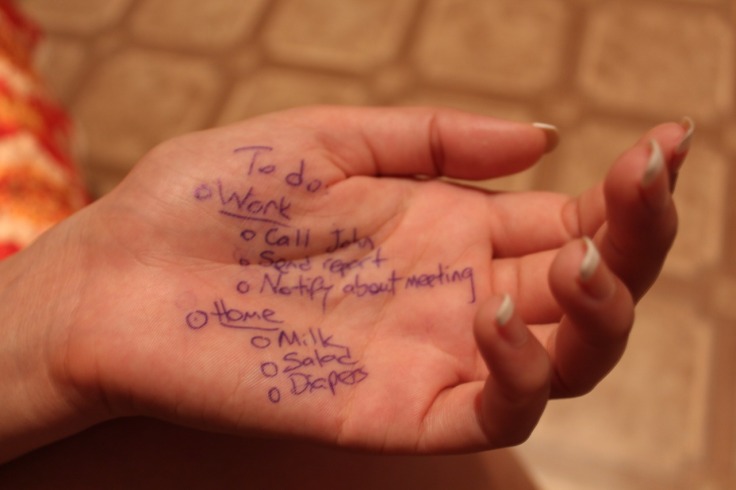For the past three weeks my life has consisted only of
- working (too much),
- eating (unhealthy),
- studying (too hard) and
- sleeping (not enough).
Not a single day has given me a little break and I’ve reached a point where I woke up in the morning and cried, because the stress was just too much.
There are hundreds of tips on the Internet on how to reduce stress… Yeah, great, but what if you have so many things to do – all at the same time, of course, and nothing you can delegate – that you just can’t reduce the pressure?
Then it’s all about managing it! Here’s how I dealt with my time and stress issues and I hope that one or two tips might help you as well:
Step 1: Make a list

I’m a person who needs to write everything down in order to get a good overview of the things I have to do. I prefer making a list with all the tasks I have to do, regardless of their order. Then I rank the items according to their priority (e.g. deadlines, importance…).
Usually, I calm down already after having made a to-do list, because suddenly the huge blob of scary tasks is broken down into little bits and pieces that seem to be manageable.
It doesn’t matter if you write a list, use post-its or plan your tasks in apps. I’ll try other techniques as well in the future. 😉
Step 2: Set realistic goals

My study goal was to memorize the content of 333 DIN A4 pages of medical content in 3,5 weeks. But that number was scary. Very scary. And because of that, I needed to break this huge goal into several smaller and more realistic ones. According to Step 1 I made a list of all the chapters I needed to learn, wrote down all the dates until the deadline and then distributed the chapters over the dates.
Not only did I break down the workload and made it look less terrifying, but by spreading the chapters over the 3,5 weeks, learning all of them suddenly seemed to be possible!
Step 3: Efficiency vs. effectiveness
I had to accept that when dealing with an enormous amount of work in a limited amount of time, you just can’t have everything. I’m a perfectionist, so that’s something that really bothers me.

You need to find the right balance between effort and priority. Let me show you what I mean in this little example:
- Studying – My top priority, so everything else has to revolve around that
- Work – I can’t cut back on quality, so I tried to avoid overtime
- Sleep – Everyone needs to sleep, but I accepted that it’s gonna be 1 or 2 hours less per night for some time
- Household – Well, I focused on the most important tasks and accepted a little dust here and there 😉
- Sport – Some of the already posted Lazygetics tips come in quite handy here, because I already integrated fitness in my daily routines, so I don’t have to cut back on them!
- Food – Cooking takes time, which I didn’t have. But instead of living off fast-food, I bought healthy snacks (apples, bananas…), wholegrain bread and the like. Deep-frozen food, such as vegetable mixes, are a great basis for delicious stir-frys.
Try to focus on the task at hand. Don’t worry about all the other things and don’t try to do several things at once. You’ll be less productive and quality will suffer.
Step 4: Take breaks

I found out that I needed breaks not only to keep my sanity, but also to give me something to look forward to having. It might seem counterproductive, because when you’re already running out of time to complete all your tasks you don’t wanna stop for breaks. But from time to time you need to allow your body and brain a little rest.
Do something you like, something rewarding, in your breaks. Enjoy an episode of your favorite TV series, play a video game, read the next chapter of a book you like and so on. At least that’s what I did. In the end, you need breaks to be able to start fresh into your next task.
Step 5: Go back to Step 1!
 Of course, life doesn’t always fit into a pre-made schedule! You have to go back and reassess your list, eliminate or adjust tasks that are completed or – unfortunately – add new tasks. And that’s what I had to do as well.
Of course, life doesn’t always fit into a pre-made schedule! You have to go back and reassess your list, eliminate or adjust tasks that are completed or – unfortunately – add new tasks. And that’s what I had to do as well.
The closer you get to your deadline, the more you’ll find the need to delegate some of the tasks that are still on the list. In my case, I delegated lots of the household tasks to my SO. 😉
Step 6: Get enough sleep

In our sleep we process everything that happened during the day, recover and gain strength for the next day. Our body and brain need at least 7 hours to do that. You might think that, if you sleep less, you have more time during the day to complete your tasks. But ultimately, your mood will suffer, you will have less energy, you’ll get sick easier and overall, you won’t get your tasks done – at least not in the quality you want.
I underestimated the importance of a good night’s rest as well. I slept 4-5 hours per night and in the end, everything I studied was already gone the next day. With more sleep and more breaks during the day, I was more successful in my studies and at work.
My conclusion:
When at first, everything was overwhelming and seemed impossible to do, by following these 6 steps I was able to manage the time I had to complete my tasks a little better. As I said at the beginning: I couldn’t reduce the stress that the tasks put on me, but I was able to control how to deal with it.
If you have more tips and tricks on time and stress management or just want to give your opinion on my 6 steps, please let me know right below in the comment section or on Facebook or Twitter!


Please share your thoughts!